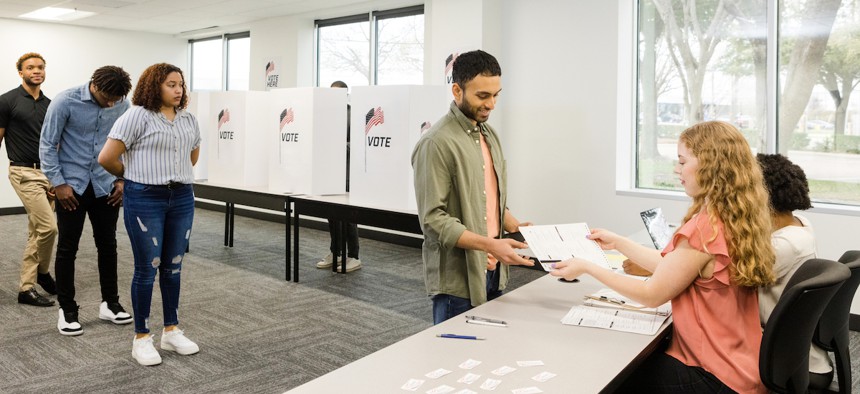Counties use high school students as poll workers to shore up staff

SDI Productions/Getty Images
Aging poll workers leaves some Indiana communities short-staffed during election time. A statewide program helps fill those workforce gaps by recruiting high school students to help with administrative tasks during elections.
This story is republished from Indiana Capital Chronicle. Read the original article.
A state law allowing counties to hire high school students as poll workers fills gaps in election staff for several counties around the state—both large and small.
Under the Hoosier Hall Pass program, 16- and 17-year-old students can staff the polls, missing a school day for “a ‘live’ experience of democracy in action,” as touted by the Secretary of State’s (SOS) office.
Allen County Director of Elections Amy Scrogham said her office had roughly two dozen student workers out of 460 poll workers, with more waiting in the wings if shortages popped up.
“As soon as the legislation let us do it, we jumped on it because we thought it was a fabulous idea,” Scrogham told the Indiana Capital Chronicle about hiring students.
Bringing Minors to the Polls
In order to participate, students must have written approval from their principal as well as guardian approval. They must finish mandatory training and maintain a grade point average of at least 3.0 on a 4.0 scale, according to the SOS.
In Allen County, finishing the training nets the student worker $25 and successful poll workers will get another $85 after election day—though poll worker compensation varies from county to county.
Students can work as either a clerk, assistant clerk or assistant judge, verifying voter information or assisting voters at the voting booths. However, the teens cannot be employed as inspectors tasked with overseeing ballot counts and managing polling locations.
An estimated 4.3% of Indiana’s poll workers were under the age of 18 in 2020, higher than its peer states and higher than the national average of 3%, according to an analysis from Tufts University.
According to the report, rural areas were less likely to recruit workers under the age of 25 despite their aging populations but highlighted one Indiana exception: Franklin County, where 70% of poll workers were under 25.
“Because elections happen everywhere, the opportunity to serve as a poll workers—especially when intention recruitment reaches young people—can be an excellent opportunity for youth to engage with and learn about the electoral process, including in rural committees,” the report said.
A Boon to Rural Counties, but Not All
For some rural counties with declining populations, their pool of once-reliable election workers are dwindling as they age.
“These are regulars that have been doing it for years. Several of them are getting up in age and will probably in the next couple of years not be doing it anymore. I kind of suspect that we’re going to have a little bit of difficulty finding some (new poll workers) when that happens,” said Penny Waggoner, deputy clerk in Martin County.
This election cycle requires just ten poll workers to cover the four open precincts in a handful of Loogootee elections.
Waggoner said the county has utilized student poll workers in the past but doesn’t have any this year. But at least one former student worker returned to work the polls again as an adult—a plus for stabilizing staff numbers in future election cycles.
“That’s probably going to be one of the things that we’ll try,” Waggoner said about future recruitment efforts.
But not every county has found that workforce to be reliable.
None of the estimated 100 workers across 45 precincts in Boone County are students this cycle, and the current poll workforce is consistent enough that the department has never relied on teens, said Boone County Clerk Lisa Bruder.
“We really have an issue with that—younger kids don’t always show up. Whether it be they overslept … (or) they can’t drive,” Bruder said. “A lot of them are in sports so then they can’t work the whole day.”
A few high school students who are 18 have worked the polls but “we usually have (enough) people that come back every year so we haven’t had to go looking,” Bruder said.
Experience for Students
Still, election workers said that the experience paid off for students as well as their departments.
In Cass County, two of their 34 poll workers were students, said Sherrel Hudson, the county’s deputy of voter registration.
“One of them, I think he’s leaning toward (a) political (career),” Husdon said. “So it’s been good for him. And I think the other one—it’s been eye-opening for her to see what we do.”
In the more populous Allen County, managing 89 election locations, everyone knows that Nov. 7 will be a long day. But the students seem to lift everyone’s spirits, Scrogham said.
“We’ve never had any disappointed students and everybody loves that they’re there,” Scrogham said. “All the workers and all the voters come in and I think they enjoy seeing the young students being active participants in the community.”





